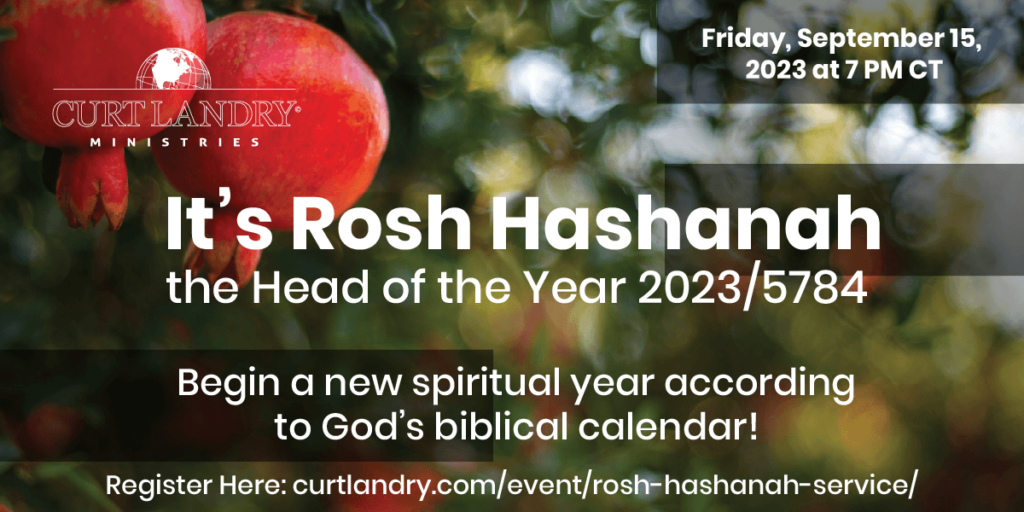Time of Inheritance and a New Season | Rosh Hashanah
Rosh Hashanah, often referred to in non-Jewish communities as the “Jewish New Year,” falls somewhere between early September and early October in the Gregorian calendar and on the first and second day of the month of Tishrei in the Hebraic calendar. It begins on the evening before Tishrei 1 and continues to sunset on the second day of Tishrei. It is a time of new beginnings and a new season. It is a time when God is opening doors and inviting us to go through the gates! Doors of new opportunities await.
Numbers Have Meaning
In Hebraic tradition, numbers have meaning. Not to tell us the future like someone with a crystal ball, but so we might better understand what God is telling us. His timing… both in the Word and in time itself.
Currently, we are in the decade of the ‘80s, according to the Hebrew calendar. This is the “decade of the mouth” because 80 is “pey” in Hebrew, which means mouth.
God does all things with intention and purpose. This year is 5784. Take a look at the significance and importance of these numbers…
5784: 5+7+8+4=24÷4=6
The number 24 is associated with the priesthood. Since it is composed of a multiple of 12, it takes on some of 12’s meaning.
The number 12 represents God’s power, authority, and perfect foundation. The number 24 is also connected with the deep true worship of God.
5=Grace. 7=Perfections. 8=New Beginnings. 4=the Door.
24÷4=6.
- 6 is “vav,” the number of man
- 80 is “pey,” which means mouth
This is the year to see His grace and perfection in Messiah for new beginnings to speak to and walk through new doors of opportunities!
This is a decade when we can choose to inherit the season of God—a new season when there is promotion, completion, and even greater authority is released through our mouths.
This decade is a time of greater responsibility to speak only the words God has given us, to do His will, and act as His shepherds on earth—not following flesh but leading with God’s light.
Alternatively, it is a time when we can choose to walk in our own timing—the timing of flesh and the world—when we can speak what we desire, and do what we desire, but without the authority, completion, and promotion that the obedient lifestyle allows–without the deeper relationship that comes with dying to our flesh daily.
It says in Ecclesiastes 3:1 that “to everything there is a season.” This past season, we have walked through narrow places, perhaps facing lack and a seemingly continual battle for every inch of breakthrough. If we cross over into a new season of divine inheritance, we will inherit the authority, promotion, and completion of following our Father. This comes from being a “King’s kid.” This is a season when the battle shifts.
Yet, no matter our choice, we are crossing into a new season where we can choose to see the open doors God has set before us and go through the gates, accepting the difficulties, responsibilities, and blessings–or continue as we have.
We have to choose if we will accept the inheritance or scurry back into the narrow place; because “not choosing” is, in reality, choosing to remain. The time of indecision regarding our walk with God is over. The time for inheritance has begun.
To everything there is a season,
a time for every purpose under heaven:
a time to be born,
and a time to die;
a time to plant,
and a time to pluck what is planted;
a time to kill,
and a time to heal;
a time to break down,
and a time to build up;
a time to weep,
and a time to laugh;
a time to mourn,
and a time to dance;
a time to cast away stones,
and a time to gather stones;
a time to embrace,
and a time to refrain from embracing;
a time to gain,
and a time to lose;
a time to keep,
and a time to throw away;
a time to tear,
and a time to sew;
a time to keep silence,
and a time to speak;
a time to love,
and a time to hate;
a time of war,
and a time of peace.”
—Ecclesiastes 3:1-8
It is not a time for half measures, for following God when it is convenient. This decade is a time of running after God as we embrace the authority, promotion, and completion of this new season. It is a time for courage. It is a time of opportunity.

Abraham’s Two Sons
One portion of the Word often read during Rosh Hashanah involves Abraham sending Ishmael—who would become a father to much of the Middle East—and his mother, Hagar, away.
To briefly place us in this time and the events leading up to it, picture this…
Sarah has been unable to bear Abraham a son, and so, as was not uncommon at that time, she sends her bondwoman into Abraham so that there might be a son to inherit. Thus, to him was born Ishmael. Now, time goes by, and God promises that Sarah shall bear a child, and she laughs because she is beyond the age of bearing children naturally. Yet, Sarah bears Abraham a son, Isaac, who would become a father to the Jewish people at God’s perfect time.
Not long after this, Sarah decides that she does not desire for the son of her flesh to share a full inheritance and position with Ishmael—the son of her bondswoman. She seeks out Abraham and tells him. This grieves Abraham, for Ishmael is still his son. Yet, God reassures Abraham that Ishmael will not be without an inheritance or promise.
- “…Whatever Sarah has said to you, listen to her voice; for in Isaac your seed shall be called. Yet I will also make a nation of the son of the bondwoman, because he is your seed.”—Genesis 21:12-13
- “And as for Ishmael, I have heard you. Behold, I have blessed him, and will make him fruitful, and will multiply him exceedingly. He shall beget twelve princes, and I will make him a great nation.”—Genesis 17:20
- “And God heard the voice of the lad. Then the angel of God called to Hagar… ‘What ails you, Hagar? Fear not, for God has heard the voice of the lad where he is. Arise, lift up the lad and hold him with your hand, for I will make him a great nation.’”—Genesis 21:17-18
Here, we come to the climax of events. Ishmael and Hagar are to be sent away, yet, there are some things that must happen first:
- Sarah must release her bondwoman from service.
- If Abraham followed Babylonian laws, as he was known to do, he would have to divorce Hagar—for having a child together would have been a type of Babylonian marriage.
- Abraham would have to give Ishmael some level of inheritance due to the inability of any father following Babylonian law to fully disown a son—this is possibly indicated by Hagar being able to purchase (this is believed due to traditions of the time despite most versions saying, ‘took’ or ‘got’) an Egyptian wife for Ishmael as she would otherwise have lacked the funds required.
Ishmael and Isaac received a level of inheritance from their earthly and heavenly Father at that time, but their positions shifted. Ishmael had already gone from being the firstborn in terms of respect and inheritance when Isaac was born, but removing Ishmael from his father’s house confirmed it.
It was a time of completion, where God’s plan to create a people for Himself from Abraham was set in stone. Isaac would be the father of Jacob, who would father the twelve tribes of Israel—God’s covenant people. Yet, Ishmael would still be given an inheritance AND promise. He would also father a great people, yet, only Isaac would receive the covenant of being God’s chosen people… for God said that Isaac would be called Abraham’s seed (see Genesis 21:12).
- “In your seed all the nations of the earth shall be blessed, because you have obeyed My voice.”—Genesis 22:18
We are at that place where we can choose to receive the blessing of Isaac or Ishmael. Now, both were loved and blessed of God and man, yet, their lives and paths were very different—despite God not being done with Ishmael yet.
We can choose to accept the inheritance of a beloved son, along with the responsibility and blessing of residing in our Father’s house OR we can choose to leave our Father’s house and go our own way. God will provide to an extent either way, but the level of authority and blessing will be akin to a piece of sand versus a mountain…
The servants of Abraham obeyed Isaac. He would have been respected, blessed, and honored throughout his days. He would live in covenant with God, dwelling in the promise of God, and have had a great inheritance. Alternatively, Ishmael was given substance to spare his life, a promise of God, and a small inheritance… he did not see the abundance of a promised land nor of authority and prosperity in the nations of the world. Ishmael may not have actively been given a choice to stay in his father’s house or go… but we, through God’s grace, have.
Conclusion
As we continue into the decade of the ‘80s, entering 5784, it is time see the doors that God has opened and go through the gates, the new places of opportunities. The “4” represents doors. May you enter into His abundance and go through the gates, lacking nothing as you enter into the new year.
Yet, we are given a choice.
We do not have to go forward; we can stay where we are. We do not have to learn, prepare, or receive. However, while staying may be comfortable for our flesh—familiar and “safe”—it lacks a higher relationship with God. It is equivalent to accepting a partial inheritance instead of one filled with abundance. It is speaking as we wish instead of as God desires.
If we follow God with abandon, then in this season, we will be able to find peace in our storms, speak to the mountain to throw itself into the sea, and discover what God has for us.
Everything God has planned for us to do can happen in this season—even those things we ourselves think are too grand—for nothing is impossible with God.
- “For with God nothing will be impossible.”—Luke 1:37
Let us step into our inheritance, accepting our kinship to the King of kings—the responsibility and the blessings. Let us live with our eyes on Jesus instead of the storms. Let us speak life. Life forevermore.“…for there the Lord commanded the blessing—life forevermore.”—Psalm 133:3

